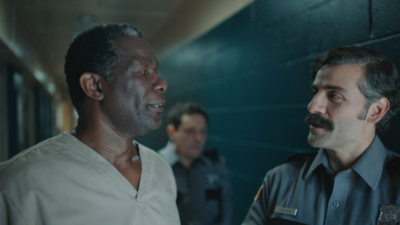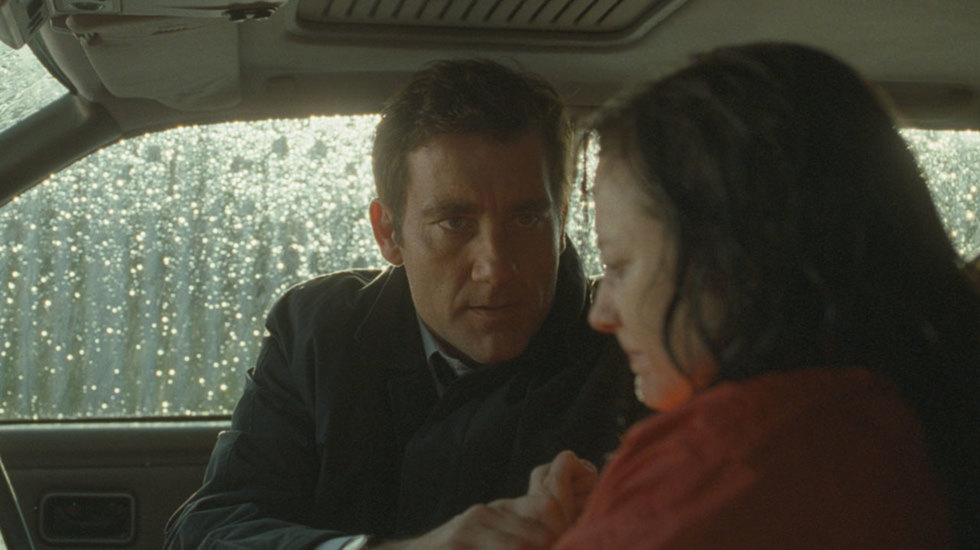
BY KAREN KEMMERLE |
Director James Marsh On ‘Shadow Dancer’ and the Espionage Genre
Oscar-winning TFF alum James Marsh ('Man On Wire') returns to the narrative filmmaking world with ‘Shadow Dancer,’ a harrowing tale of espionage in conflict-ridden Belfast.

Starring Andrea Riseborough, Clive Owen, and Gillian Anderson, Shadow Dancer is a gripping tale of betrayal and duty set against the backdrop of Belfast during the 1990s. During a botched mission to bomb a London metro station, IRA member Collette (a stirring Riseborough) is captured by MI-5. Mac, a jaded agent, moved by her beauty and the fact that she’s a single mother, offers her a choice—a 25-year jail sentence or a fresh start, which will only be given if she reports on her brother’s activities and IRA plots. Torn between these impossible alternatives, Collette opts to become an informant and needs all her wits in to save her son and herself from both sides.
We sat down with director James Marsh, who works in the documentary (Man on Wire, Project Nim) and narrative (Red Riding: 1980, The King) realms with equal skill, to discuss Shadow Dancer, his complex female protagonist, and ways to make the most ordinary of situations suspenseful. The film opens today in New York and LA and is currently available on-demand.
Tribeca: Your filmography reflects an interesting blend of narrative and documentary projects. What drew you to a period espionage thriller like Shadow Dancer?
James Marsh: I like thrillers as a genre both as a viewer and as a director. It is a medium, along with horror films, that allows you a lot of control over the mood of the film. Plus, with thrillers you’re dealing with emotions that you can control—you can choose to either to conceal information from or reveal it to the audience. I like that kind of formal part of the thriller.
With Shadow Dancer, I wasn’t sure when I was given it whether Northern Ireland was a place I wanted to go back to having grown up the UK at the height of all the conflict there. I wasn’t sure the world was ready to see a film rooted in that reality. However, this film felt like it had some unusual aspects to it. The film was set around the time that the peace process was beginning, and we now see that it bore fruit.
I also like the female perspective a lot. I like the idea of the events happening in the film through the eyes of a female protagonist. Plus it’s just a good story. Any film that allows a character or requires a character to be something they’re not every day—in this case a spy who must report on her own family—is very intriguing to me as a narrative.
Tribeca: Tom Bradby adapted his novel for the film. Were you able to collaborate with him on the screenplay? Were you familiar with his book previously?
JM: No, I wasn’t. Even now, I have not read it. Tom is a very gracious person and wrote a script, which is his first screenplay,that was very good already. I began to read the book, and I thought that it wasn’t very helpful. For me, he’d already done so much good work in extracting a script from the novel, that I was comfortable focusing on that, and so we worked together on the script and boiled it down even more. So Tom knows I still haven’t read the novel. [laughs]
You take on a different responsibility for each actor you cast.
Tribeca: I read that Mac, the jaded MI-5 agent played by Clive Owen, was much younger in the book.
JM: Younger and sort of tougher and slightly more of a conventional, archetypal cynic. I felt that Clive would bring something different to the role, and indeed he took the character quite a bit further when he started working with us, and I think rightly so. He becomes a man troubled by his conscience and that becomes a very dangerous thing in the position he finds himself in. He also has the growing awareness of a responsibility to someone whose life is in his hands. As the film unfolds, that becomes a very dangerous quality to have, to have some goodness in you.
Tribeca: In addition to Clive Owen, you have a tremendous ensemble cast including Andrea Riseborough and Gillian Anderson. How did they come aboard the project?
JM: We were very blessed by the quality of actors that we approached and who wanted to do the film. Plus, we had an amazing Irish ensemble cast. When I first read the script, I immediately thought of Clive. He does much bigger films than this, but I’ve seen him do some small British films where he just blew me away. We just got lucky that he had a window [when] he wasn’t supposed to be working. We got to him at the right time, and then the film was finally greenlit. He said, “I’ll do this” within two days and was committed. That’s the kind of person Clive is; he’s decisive and will do what he says.
With Andrea, I’d seen her work on British television and I thought she was really interesting. When I met her, she just bowled me over. She had such empathy for the character and had such good ideas about how to do the role. Plus, she did so much diligent research and built an accent that’s very hard to learn, which involved spending time in Belfast and having conversations with people involved in the conflict. She brought all that to us, that was her gift to us. As for Gillian, she had seen Man on Wire and liked it and so was open to the idea of meeting me. When we got on so well, she wanted to do the movie.

Tribeca: When directing with such a powerhouse cast, do you change your approach? Do experienced actors need the same rehearsal time that you might give a less seasoned cast?
JM: I’m not big on rehearsals. I like to get with what the actors want from me and from the process, but some actors like to rehearse, so then I’m happy to rehearse. In this case, there wasn’t an opportunity to rehearse because of our schedules, so we had to kind of make it all happen on set.
You take on a different responsibility for each actor you cast. Each actor wants something slightly different from you, and part of your job going into a film is to understand what the individual actor needs. Some need a lot of support; some just want you to keep out of their way and to let them get on with the job. Generally speaking, my way with actors is to cast people I think are really great and just let them get on with it.
Tribeca: Duality and betrayal, as in any spy movie, are two important themes in Shadow Dancer. How did you utilize these elements to enrich the storytelling process?
JM: Well, when I first got the script, I felt we couldn’t do it just purely for financial reasons because there were these big epic action sequences. We couldn’t afford to do an elaborate motorbike chase through the streets of London. We couldn’t do that with the budget we would have. So we began to look at how to create suspenseful scenes out of much more normal events. If we do our work correctly, we felt we could create the sense of growing anxiety out of things that are very routine.
For instance, we would make washing the dishes feel like it’s a suspenseful thing. At the end of the story, one of our characters is cleaning up and about to meet a very uncertain fate, and the fact that the character is dish washing was really suspenseful. So that became the job in a way—to try and extract real true suspense from really quite normal and actually quite boring situations.
As the film unfolds, that becomes a very dangerous quality to have, to have some goodness in you.
Tribeca: I thought it was so interesting that amidst all her inner and outer turmoil Collette was able to enjoy the little things—like taking her son to school and joking with her brothers.
JM: To some extent, that’s like having to put a brave face on things or forgetting your troubles just momentarily, as you do if you’ve known someone that you’ve loved has died or something. When you remember again and it all comes flooding back, it’s almost worse because you’ve had a moment of relief.
There are certain moments in the family—one scene in particular where the brothers bring a bicycle to Colette’s son—that take on the kind of quality of a normal family gathering that is layered with their knowledge that, while they are all betraying each other, they’re still a family. There is still blood between them. They still have these rituals and can actually enjoy each other despite everything else that’s going on around them.
Shadow Dancer is now playing in NY and LA and will be expanding to select cities across the country in the upcoming weeks.

